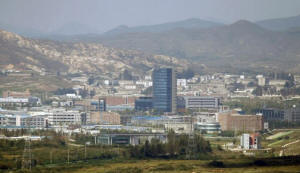|
South Korea 'humbly accepts' there is no
proof border park cash funded North's weapons
 Send a link to a friend
Send a link to a friend
 [January 16, 2018]
By Hyonhee Shin [January 16, 2018]
By Hyonhee Shin
SEOUL (Reuters) - South Korea said on
Thursday it "humbly accepts" there is no evidence North Korea diverted
wages paid to its workers by South Korean firms in a now-closed border
industrial park to bankroll its weapons programs as the previous
government asserted.
The South's unification ministry was responding to the findings of a
panel which contradicted claims of money being transferred by North
Korea as it pursues its nuclear and missile programs in defiance of U.N.
sanctions.
It said would take follow-up steps to boost transparency and public
trust in its policy towards the North.
South Korea said last year that most of the cash that flowed into the
jointly run Kaesong complex was being diverted. It made the claim when
it pulled out of the joint venture in response to the North's launch of
a long-range missile.
In July, two months after liberal President Moon Jae-in was elected, a
South Korean government official said there was no hard evidence to back
up the assertion.

The decision to suspend the Kaesong project was "unilaterally and
verbally" made by Moon's predecessor, ousted president Park Geun-hye, a
day after the missile test and without any formal discussions within the
administration, the panel, appointed by the unification ministry, said.
"The presidential office inserted the wage-diversion argument as major
grounds, yet without concrete information, sufficient evidence and
consultations with related agencies, mainly citing defector testimonies
that lack objectivity and credibility," Kim Jong-soo, a priest who heads
the panel, told a news conference.
"This impairs the decision's legitimacy and could constrain our ground
over a future restart of the complex, while hampering the companies'
rights to protect their assets due to the hasty pullout process."
About 120 South Korean companies paid about double the $70 a month
minimum wage in North Korea for each of the 55,000 workers hired in
Kaesong.

[to top of second column]
|

The inter-Korean Kaesong Industrial Complex is seen across the
demilitarised zone (DMZ) separating North Korea from South Korea in
this picture taken from Dora observatory in Paju, 55 km (34 miles)
north of Seoul, September 25, 2013. REUTERS/Lee Jae-Won

The project resulted from the first inter-Korean summit meeting in
2000, when leaders of the two Koreas vowed reconciliation and
cooperation. It was the last remaining symbol of inter-Korean
rapprochement amid frosty cross-border ties.
Moon has pledged to reopen the industrial park if there is progress
on the North's denuclearization, but political tensions and the
North's aloofness have tied the president's hands.
Reclusive North Korea and the rich, democratic South are technically
still at war because their 1950-53 conflict ended in a truce, not a
peace treaty. The North regularly threatens to destroy the South and
its main ally, the United States.
A group of South Korean businessmen who own factories in Kaesong
demanded a formal apology.
The companies together suffered losses of 250 billion won ($200
million) due to the closure, aside from equipment and raw materials
left behind, the group said in February.
"Now that the wage-diversion claim has proved groundless, the
government must apologize for abusing state power to suspend the
complex and make utmost efforts to reopen it," the group said in a
statement after the conference.
North Korea’s state-run web sites said in October the country had
restarted some operations in Kaesong on its own, saying it was
"nobody’s business what we do in an industrial complex where our
nation’s sovereignty is exercised”.
(Reporting by Hyonhee Shin; Editing by Nick Macfie)
[© 2017 Thomson Reuters. All rights
reserved.]
Copyright 2017 Reuters. All rights reserved. This material may not be published,
broadcast, rewritten or redistributed.
 |